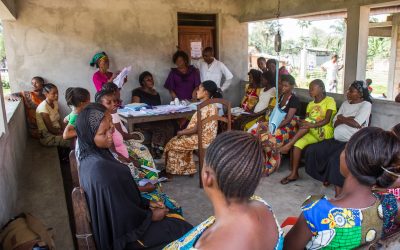ASSP
Access to primary health care project | Accès au Soins de Santé PrimaireABOUT ASSP
The Access to Primary Health Care program, known locally as ASSP, uses a health systems strengthening approach. ASSP collaborates with the Ministry of Health, or MOH, at the national and provincial levels, giving focused support to health zones, health facilities, and community levels. In addition, IMA and its partners ensure that more than 75% of the project resources are concentrated within the health zones. In other words, the majority of funds pay for programs that provide for service delivery, empowerment, accountability and capacity building of local community service organizations, partners and MOH representatives.
The project supports 9.7 million people across 52 health zones.
ASSP works in five provinces: Kasaï, Kasaï Central, Maniema, Nord-Ubangui, and Tshopo.
Where We Work
ASSP supports DRC’s National Health Development Plan. Specifically, we work to improve access to and coverage of primary health care services.
ASSP aims to strengthen priority interventions such as the treatment of malaria, pneumonia, and diarrhea. In addition, its programs work to strengthen nutrition, obstetrics and neonatal care, family planning, immunization, and water, sanitation, and hygiene interventions. Most importantly, all of its services are delivered through the existing health system. Therefore ensuring the sustainability of the programs implemented. These intervention packages are aimed at improving maternal and child health. Thus allowing the DRC to achieve significant progress towards reaching Millennium Development Goals 4, 5 and 6.
read more about our work to improve access to primary health care in the drc
DFID and the SIDA allocated £182,899,146 to support the Government of the Democratic Republic of Congo’s efforts to improve the health of its citizens. Accordingly, IMA World Health was selected as the lead organization to implement ASSP and in collaboration with the MOH. In addition, four implementing partners support the program at the provincial level: SANRU, World Vision, CARITAS and International Rescue Committee. Finally, four technical partners provide assistance at the national level: Tulane University (Operational Research), Pathfinder (Reproductive Health and Family Planning), HISP (Health Information Systems) and IntraHealth (Human Resource Information Systems).
Implant Method in DRC: A Family Planning Success Story
Spreading the Word about the Implant Method in DRC.News is spreading about the implant method in...
Implants Create Opportunity in DRC: A Family Planning Success Story
Julienne is one of the many women we celebrate during International Women’s Month. She is a...
Safe Delivery App Helps Health Workers Respond To Emergencies In DR Congo
Dr. Nancy Bolan knows how important it is for health workers to have up-to-date information when...
QUICK CONTACTS
Recent Posts
Implant Method in DRC: A Family Planning Success Story
Spreading the Word about the Implant Method in DRC.News is spreading about the implant method in DRC. The families featured in this article are partly to thank. The stories below are just a snapshot of the impact the implant has made on the lives of families using the...
Implants Create Opportunity in DRC: A Family Planning Success Story
Julienne is one of the many women we celebrate during International Women’s Month. She is a shining example of how implants create opportunity in DRC. She is a 43-year-old mother of four and a force to be reckoned with! Julienne and her husband had three children when...
Safe Delivery App Helps Health Workers Respond To Emergencies In DR Congo
Dr. Nancy Bolan knows how important it is for health workers to have up-to-date information when responding to a maternal or newborn emergency at a clinic in the Democratic Republic of Congo. While serving as a deputy country director for IMA World Health in DRC from...





